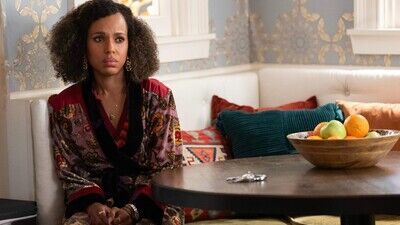One sequence dramatizing the oft-used metaphor of “wrestling with emotions” is truly inspired, leveraging the best of TV to dramatize what could be just a few people sitting around and talking. Via a highly stylized wrestling set piece, it shows what probing therapy sessions really feel like, visualizing the drama in ways surprising, delightful, and devastating.
This trick of balancing tones – of having a laugh-out-loud comedy about intergenerational trauma and the systemic racism that helps foster it – well, it would be easy to mess up. But there’s clearly a deep well of authenticity at the center of “UnPrisoned” and it allows this show to succeed at concepts that are full of pitfalls on paper.
Season two has less direct commentary on the systemic aspect of Edwin’s struggles. Season one had a whole episode about how he needed his birth certificate to get a driver’s license and thus drive legally (unlocking a lot of recidivism-stopping job opportunities) – but he was blocked by a racist and byzantine Southern records system, effectively creating a Catch 22 blocking his way to legitimately joining society.
There’s nothing like that in season two, but systemic racism still undergirds the family’s many problems. As such, it gets more than a passing mention and indeed the show’s whole setup is a more thoughtful look into how racism hurts and limits Black people than is present in many a hard-hitting drama.
With its clear-eyed understanding of how race functions in the US, “UnPrisoned” is able to build on its first season, growing only more self-assured in its voice. This season may be more about personal rather than systemic problems but it still delivers incisive social commentary rooted in the stories of three deeply human characters. This is a show that knows life is both serious and silly, pain manifests in both ridiculous and tragic ways, and we persevere with both laughter and tears.
As such, “UnPrisoned” is not so much a show about trauma or healing. Its characters are more than the worst things they’ve experienced, even as their pasts remain present. It’s a show about family, growth, and Black joy and it’s a damn good one.

